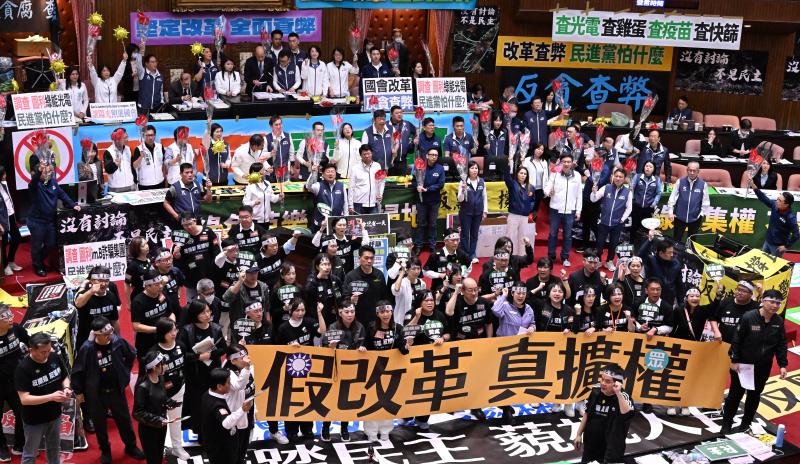President William Lai (賴清德) on Tuesday approved the Cabinet's request to return a set of contentious legislative reform bills to the legislature, which could hold a final vote on Tuesday next week at the earliest.
The changes to the Act Governing the Legislative Yuan’s Power (立法院職權行使法) and the Criminal Code were passed by opposition lawmakers voting in the majority on May 28.
The Executive Yuan on Thursday last week formally decided to return the legislation to lawmakers for reconsideration pending approval from the president, a power afforded to it under the Additional Articles of the Constitution.

Photo: Liu Hsin-de, Taipei Times
Lai at 11am on Tuesday sent the approved proposal back to the Cabinet, while the Presidential Office secretary-general notified the Legislative Yuan of the decision, office spokesperson Kuo Ya-hui (郭雅慧) said.
The president carefully considered the Cabinet’s reasoning and decided to approve its constitutionally afforded right to return the legislation, Kuo said.
He hopes all parties will carefully scrutinize the content of the bills and reach a consensus that is legal, constitutional and prioritizes national interests, Kuo added.
Article 3-2 of the Additional Articles of the Constitution stipulates that if the Executive Yuan finds a bill passed by the Legislative Yuan difficult to execute, it can within 10 days of receiving it request the legislature to reconsider the bill, provided it has the president’s approval.
The legislature is required to convene at most seven days after receiving the request and vote on whether to uphold the passage of the bill within 15 days.
More than half of all sitting legislators — or a minimum of 57 votes in the current legislature — must vote yes to uphold the bill.
If the legislature fails to reach a decision within this period, it would become invalid.
The soonest the legislature could reach a conclusion is on Tuesday next week.
Additional reporting by CNA

The Ministry of Economic Affairs has fined Taobao NT$1.2 million (US$36,912) for advertisements that exceed its approved business scope, requiring the Chinese e-commerce platform to make corrections in the first half of this year or its license may be revoked. Lawmakers have called for stricter enforcement of Chinese e-commerce platforms and measures to prevent China from laundering its goods through Taiwan in response to US President Donald Trump’s heavy tariffs on China. The Legislative Yuan’s Finance Committee met today to discuss policies to prevent China from dumping goods in Taiwan, inviting government agencies to report. Democratic Progressive Party Legislator Kuo Kuo-wen (郭國文) said

The Ministry of Economic Affairs has fined Taobao NT$1.2 million (US$36,900) for advertisements that exceeded its approved business scope and ordered the Chinese e-commerce platform to make corrections in the first half of this year or its license would be revoked. Lawmakers have called for stricter supervision of Chinese e-commerce platforms and more stringent measures to prevent China from laundering its goods through Taiwan as US President Donald Trump’s administration cracks down on origin laundering. The legislature’s Finance Committee yesterday met to discuss policies to prevent China from dumping goods in Taiwan, inviting government agencies to report on the matter. Democratic Progressive Party

Taiwan and its Pacific ally Tuvalu on Tuesday signed two accords aimed at facilitating bilateral cooperation on labor affairs, according to Taiwan’s Ministry of Foreign Affairs (MOFA). The governments inked two agreements in Taipei, witnessed by Foreign Minister Lin Chia-lung (林佳龍) and visiting Deputy Tuvaluan Prime Minister Panapasi Nelesone, MOFA said in a news release. According to MOFA, the agreements will facilitate cooperation on labor issues and allow the two sides to mutually recognize seafarers’ certificates and related training. Taiwan would also continue to collaborate with Tuvalu across various fields to promote economic prosperity as well as the well-being of their

Sung Chien-liang (宋建樑), who led efforts to recall Democratic Progressive Party (DPP) Legislator Lee Kun-cheng (李坤城), was released on bail of NT$80,000 today amid outcry over his decision to wear a Nazi armband to questioning the night before. Sung arrived at the New Taipei District Prosecutors’ Office for questioning in a recall petition forgery case last night wearing a red armband bearing a swastika, carrying a copy of Adolf Hitler’s Mein Kampf and giving a Nazi salute. Sung left the building at 1:15am without the armband and covering the book with his coat. Lee said today that this is a serious